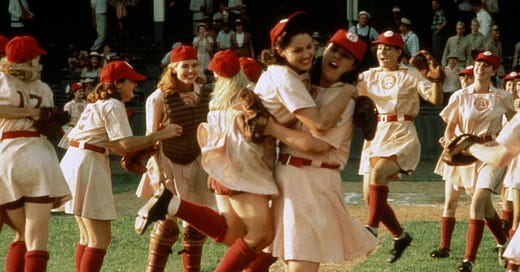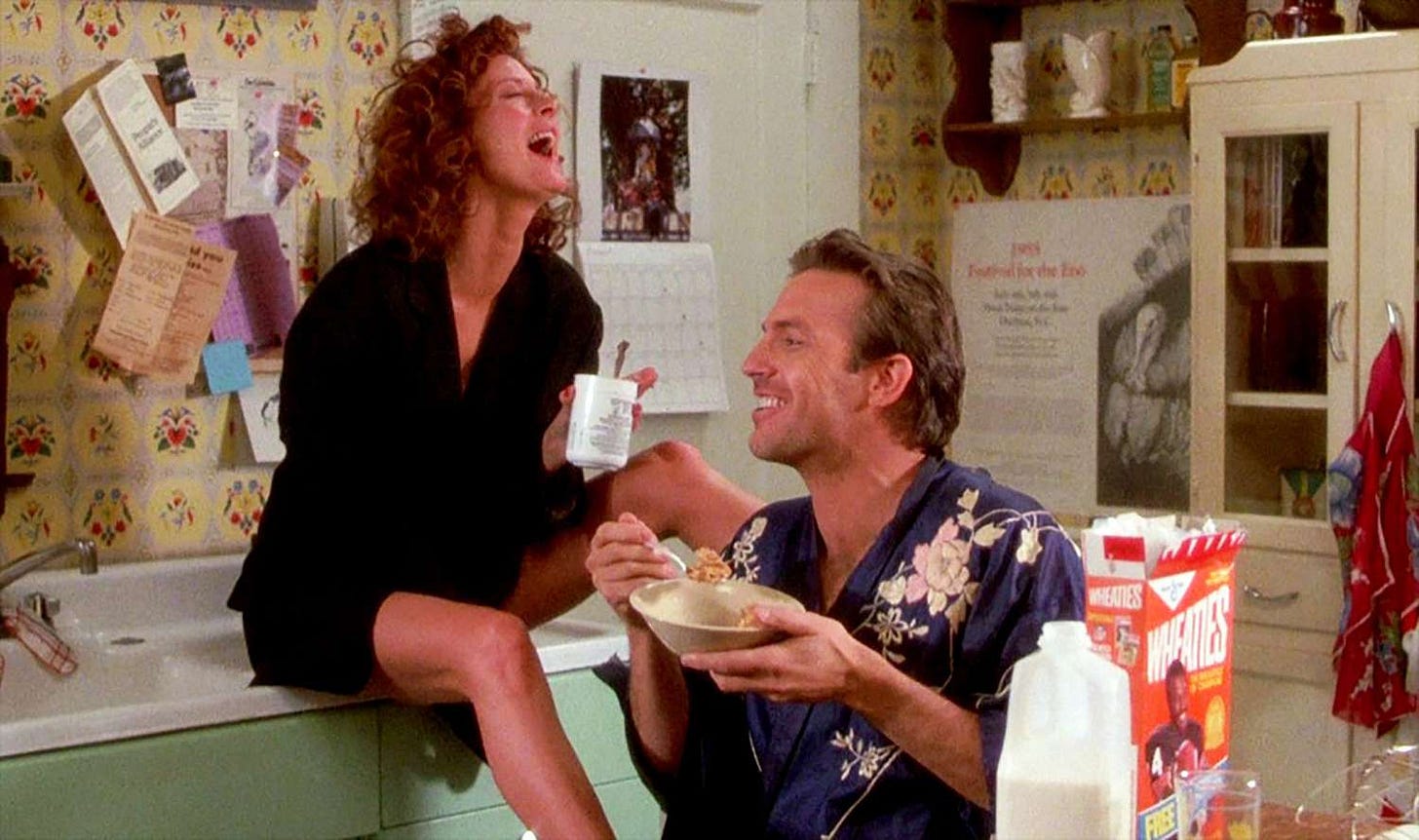Top 50 Baseball Movies: #5-1
Some cheaters, a smart kid, some bears, some bears, and some peaches
Today is publication day! My book Baseball: The Movie is available everywhere you buy books right now. If you buy a copy, I’d love to see it. Take a photo of yourself, post it on social media, and tag me. Most of all, I hope you enjoy reading it. If you’re here—and you enjoy being here—I suspect that you will.
I also have a brand new website, which you can find at noahgittell.com. There’s plenty of book information there, including a list of all my upcoming events. I’d love to see you out there on the road. The first event is tonight in New York at the Barnes & Noble on the Upper West Side. Come on out!
Finally, we get to my five favorite baseball movies. It has been a long road to get here, full of greats, gorillas, and Gehrigs. There have been a lot of laughs, and maybe a few tears. For today’s top five, I’m going to eschew the tradition of summarizing each film’s greatness, and simply reprint a few key lines from my book on each film. Let’s get to it.
5. Eight Men Out (1988)
“Confronting your nostalgia is a key part of growing up, for people, for baseball, and, most especially, for baseball movies. When Buck Weaver (John Cusack) tries to explain to one of those street kids why his teammates threw the Series, he uses vague language about the complications of an adult world the kids couldn’t possibly understand. So why didn’t he take money, too, the kid asks? ‘I guess I never grew up,’ he replies. Buck Weaver was 29 years old when all this went down, but Cusack, in his first adult role after starring in teen comedies Better off Dead and One Crazy Summer, was only 21, barely more than a kid himself. He was the right actor to deliver this important sentiment that explains why these filmmakers, raised in the ‘60s and maturing into adults in the ‘80s, continued poking at the legend of Shoeless Joe and the 1919 White Sox. With these films, they are revisiting the game of their youth and working to uncover the complicated adult realities behind them. In their way, they're all just trying to grow up.”
4. Little Big League (1994)
“Little Big League is about a 12-year-old child who becomes owner and then manager of the major league Minnesota Twins. It also might be the most realistic baseball movie ever made. Rookie of the Year told a tale about a kid who gets to the major leagues, but they made everything around him so silly and cartoonish that it ruined the fun. It wasn’t exciting or even interesting that he was there because everything else on the screen was just as ridiculous. You need a dash of realism to make absurdism compelling. Little Big League gets this. It builds a ridiculous flight of fancy on a rock-solid foundation of baseball knowledge.”
3. The Bad News Bears (1976)
“Having grown up in the 1950s, director Michael Ritchie was surely inundated with the same postwar imagery of good-natured children who got up to harmless trouble in television like Father Knows Best, The Adventures of Ozzie and Harriet, and Leave it to Beaver. Throughout the ‘60s, this didn’t really change. In the media, adults were flawed, and teenagers could be hoodlums, but children remained unimpeachable. The Bad News Bears may have saved its harshest commentary for the adults, but portraying children who curse, fight, spit, and shove chocolate bars into their mouths was a sharp turn away from the Rockwellian images of kids sitting at their father’s seat in submission. It’s meant to shock those who still believed in the postwar fantasy of the angelic suburban child, and delight those who grew up in reality, where kids can be cruel, ruthless, and hilariously funny, all at once.”
2. Bull Durham (1988)
“Then there’s the language. Never before have a film’s baseball players talked so openly about sex. ‘I believe in the soul, the cock, the pussy,’ says Crash in his famous speech. Sex is constantly referred to as ‘fucking,’ rarely with a euphemism. In Bull Durham, sex is many things: an act of pure lust, a training tool, a warmup routine, a way to protect yourself, a way to make yourself vulnerable. Karina Longworth, who discussed the film on a season of her film history podcast You Must Remember This, points out that the sex scenes are actually rather tame, but the film was still marketed as an adult movie and given an R rating by the MPAA’s Ratings Board. ‘The rating comes almost entirely from the dialogue,’ she notes. Shelton’s words are lurid—and often florid—but they serve his thoughtful approach to gender equality. Sexual oppression lives in the shadows, and when the realities of sexual dynamics are exposed to the light of day, women have a far better chance to create a level playing field.”
1. A League of Their Own (1992)
“The endless debate over whether Dottie dropped the ball on purpose has helped keep A League of Their Own alive in the public discourse. For that reason, it matters. The truth, however, is that there is no right answer because we’re asking the wrong question. It’s not important whether she intended to drop the ball. What matters is why the film needs her to. Throughout the movie, Dottie is conflicted between being a housewife and a ballplayer. TO some degree, it’s the conflict within all the players, and the film rightly passes no judgment either way. Marla and Dottie leave the team for their husbands. Other characters stay with baseball for as long as they can, and being a ballplayer becomes their identity. In his perceptive review, Roger Ebert credits this nonjudgmental approach to its woman director: ‘A man might have assumed that these women knew how all-important baseball was. Marshall shows her women characters in a tug-of-war between new images and old values, and so her movie is about transition—about how it felt as a woman suddenly to have new roles and freedom.’
“When Dottie drops the ball, it indicates to the viewer that she will not choose baseball. Despite her love of the game, she will not abandon her dreams of motherhood for it. Nearly a century later, we know that women can be professionals and wives and mothers all at once, but at this moment of new image and old values, Dottie can’t see that. She feels like she must choose one or the other—perhaps watching Evelyn try to blend the two by bringing her monstrous child Stilwell to work dissuaded her from attempting to have it all. When the ball slips out of her hand, she is showing us who she is and what she cares about, intentionally or not. It allows her to return home, and for Kit to stay and continue forging her new identity. Did Dottie drop the ball on purpose? It does not matter. She had to drop the ball—to literally let go of baseball—or the movie doesn’t make sense.”





Happy publication day, and perfect choice for No. 1!
I can’t argue with these choices - nope, I cannot.